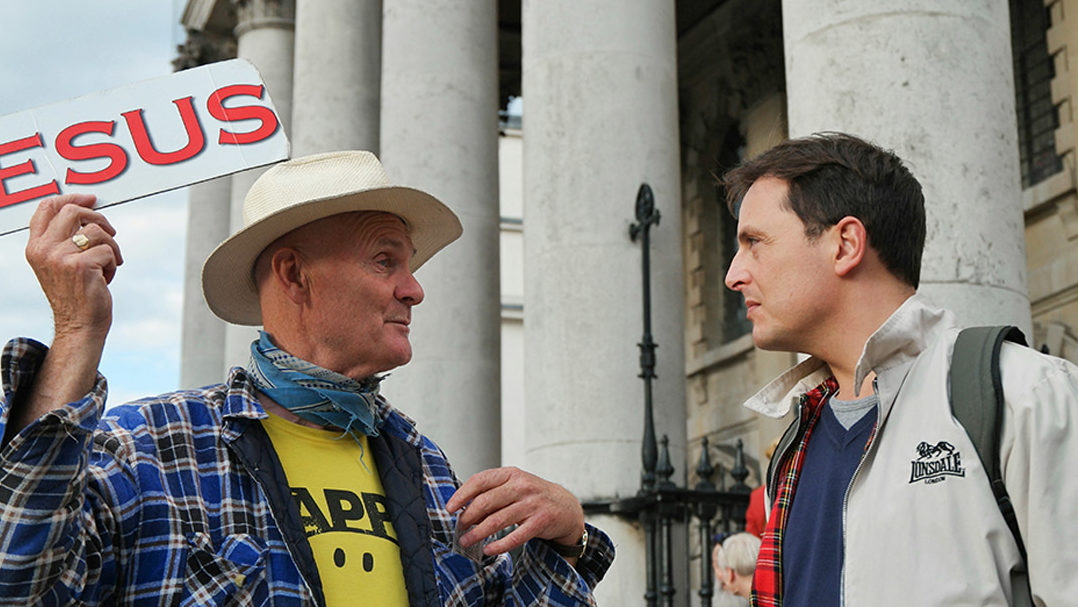
05 Dec Religion and Anti-Discrimination Laws: What’s It all About?
At the present time Federal Parliament is debating whether to remove exemptions in the Sex Discrimination Act which allow religious educational bodies to discriminate if they are acting in accordance with their religious beliefs. The stated purpose of these changes is to prevent religious schools from expelling or refusing to admit gay students, however the potential impact of the changes on people of faith could be far more extensive.
There are three broad concerns connected with religious freedom in relation to sexuality and gender rights. One concern is about the right to discriminate. Another is about the right to express one’s views: the right to freedom of speech Another is about raising children, what they will be taught, and what role parents can have in important decisions affecting a child’s upbringing. This blog post is about the first issue: the right to discriminate.
Australia has laws at state and federal level to outlaw certain kinds of discrimination. The point of such laws is to prevent people from applying irrelevant and unfair personal criteria in employment and in the provision of services. For example it is illegal in Australia to choose, or not choose someone for a job on the basis of their race.
These days the word ‘discriminate’ has a very negative connotation. However in reality we all discriminate all the time, in ways that are considered completely reasonable. When ten people apply for a job, and one is chosen, the employer must discriminate between the candidates to make their choice. It is not illegal for an employer to discriminate on the basis of expertise, ability or experience. Indeed it would be unfair NOT to discriminate on such grounds.
In some contexts it is lawful to discriminate using criteria which in another context would be illegal. For example, it is illegal to refuse to offer accommodation to someone based on their race, but in Victoria there is a ‘welfare’ exception which allows a hostel to discriminate by offering lodging for aboriginal students only. Another exception applies for political organisations. It is illegal to discriminate against someone based on their political beliefs, but political organisations are exempt: a Greens Senator is allowed to refuse to employ a card-carrying member of One Nation as an advisor. That’s (lawful) discrimination. Certain kinds of work require discrimination to be applied because of job requirements. For example a film maker may discriminate by sex when choosing an actress to play a female part in a film. Similarly, it is in general illegal to discriminate on the basis of someone’s religion, but a church is permitted to prefer a Christian over an atheist or a satanist when recruiting a pastor. That’s also (lawful) discrimination.
One downside of anti-discrimination laws is that they can intrude on people’s private lives. No-one expects that the law should impose equal-opportunity principles in the domain of all personal choices. For example it is not illegal to discriminate when writing a will. Nor it is illegal to discriminate in the choice of one’s friends. It’s also not illegal to refuse to become married to another person because of their race, or to chose a lover based on their height or the colour of their hair. Equality of opportunity has it limits, as a brief glance at dating advertisements will show.
To accommodate personal freedom, exceptions may be written into laws. For example in Victoria a woman can insist that her personal carer in her own home be a woman without breaking the law, and if a B & B only accommodates two or three guests, and the owner also lives in the B&B, the owner can discriminate in who they take in, because they are inviting people into their own home, their personal space.
Although human beings discriminate unfairly for a whole host of reasons, anti-discrimination laws focus only on a certain set of protected attributes. In Victoria the protected attributes, last time I looked, were age; breastfeeding; employment activity; gender identity; impairment; industrial activity; lawful sexual activity; marital status; parental status or status as a carer; physical features; political belief or activity; pregnancy; race; religious belief or activity; sex; and sexual orientation.
So not everything is protected. So in Victoria it’s still not illegal to discriminate against someone on the basis that they swear a lot, their music preferences, whether they are rich or poor, the fact that they collect stamps, the aftershave they wear, their computer brand preference, whether they watch television, their high (or low) intelligence, whether they pick their nose in public, or their bad fashion sense.
That some attributes are protected and others not is driven by our cultural values, economic interests, and politics of course.
To apply anti-discrimination principles fairly, laws can get very complicated. Yet, sometimes people write and speak as if discrimination was a very simple issue. For example Google will only let a charity access its ‘Google for Nonprofits’ program if they do not discriminate at all, allowing no exceptions. A condition of access to this program is that an organisation “does not discriminate against any person or group of people in either hiring/employment practices or in the administration of programs and services, including on the basis of sexual orientation or gender identity.” A church would be ineligible for this program because they discriminate when employing clergy on the basis of religious belief. A sports club should also be ineligible because they select players for teams based on physical attributes such as athleticism. Of course every employer exercises discrimination when employing staff. The Google formulation is so simplistic that it is in fact unfairly discriminatory. Microsoft’s stipulation for its program of providing software to charities is much better: the recipient of their software donations must not engage in unlawful discrimination.
One issue with anti-discrimination laws is when rights conflict. For example there is a potential conflict between anti-discrimination laws and the right to freedom of association. Freedom of Association is the right for people with common interests to come together and pursue a shared purpose, such as workers when they form a trade union. When the basis for people coming together is related to a protected attribute, there is a potential for conflict with anti-discrimination principles. For example a women’s club would wish to apply gender criteria in selecting members. That’s discrimination. However Victorian anti-discrimination laws allows clubs to discriminate on the basis of sex, age or ‘minority culture’, so same-sex clubs continue to function without breaking the law. ‘Exceptions’ written into the laws allow work-arounds so Freedom of Association is protected.
For religious people the main potential anti-discrimination risk occurs because religious belief systems often include a view on what kind of sexual activities conform to the teachings of the religion. Religious organisations will wish to apply religious criteria in this domain, for example when choosing staff. A church could insist that its pastor conform to certain moral characteristics. I once heard about a Dutch church that split into TV-watchers and non-TV-watchers. To be employed as the pastor of the non-TV-watcher congregation meant forgoing owning a TV. Religious organisations discriminate using criteria which would be illegal for non-religious groups. For example is is illegal in Victoria to discriminate based on ‘lawful sexual activity’. Without an exception written into the law, this means it would be illegal to sack a pastor for committing adultery. However, many churches would ask a pastor to stand down for committing adultery, and at present they can do so legally, because of the legal exemptions written into anti-discrimination laws.
Not many people are arguing that churches shouldn’t be allowed to require ministers of religion to conform to their religion’s teachings. That would indeed be ridiculous. But there are a whole host of other roles which could be subject to dispute. Is it lawful for a church to prefer to employ a Christian receptionist or gardener? The issue becomes particularly acute in education. Should the right to freedom of association allow schools to be able to prefer to employ people who conform to the beliefs and practices of their religion? For example should a Christian school, founded by Christian people employing their right to freedom of association, be permitted to insist that a maths teacher be a Christian? Or that he or she not be in an extra-marital relationship?
Another area of potential conflict for religious people involving anti-discrimination laws is the offering of services. Should a graphic designer have the right to refuse to provide a service promoting an activity which their religious conscience prohibits? Should a cake designer be compelled to provide a cake which celebrates, creatively, a same-sex wedding. Should a Christian campsite, founded to promote Christian purposes, be compelled to accept a rental from a Wiccan convention?
There is a good deal of disagreement in the community about where the lines should be drawn in such cases. The disagreement is intense. A very important issue is under what conditions can religious beliefs, including beliefs about human sexuality, be made a necessary requirement of someone’s employment. The legal landscape is changing in relation to this – a progressive wind is blowing across Ausralia – and leaders of more conservative Christian schools should be concerned about whether they will be able to maintain their school’s ethos in the future.
For some this will be a big problem, not a small one. There are a good number of schools in Australia which require all their staff to sign a statement of faith. Such an affirmation could include a position on sexual ethics. In the future, the legal viability of such schools could be under question. The fact that schools receive significant funding from the state makes their position more vulnerable.
At base this is a conflict, not only with the right to freedom of religion, but also with freedom of association, because it impacts on the right of parents to found a school for their children which embodies the ethical and spiritual principles their adhere to.
The way Australia’s laws deal with these issues is, I believe, not well tested. Let me explain. A standard phrasing is used when religious groups are given permission to discriminate is that the exception is allowed when the discrimination: “a) conforms with the doctrines, beliefs or principles of the religion; or (b) is reasonably necessary to avoid injury to the religious sensitivities of adherents of the religion.” This wording has been around for a long time, but its application is not all that clear.
One problem with this wording is the difficulty of defining what is the ‘the religion’ in question for the group or individual against which a complaint is made. This has already been a key issue in some legal cases involving GBLTI complainants. In Sydney the Wesley Methodist mission refused to assist a gay couple to adopt on religious grounds. At first the complaint was upheld, on the grounds that gay fostering was incompatible with ‘the religion’ of the Uniting Church, to which the Wesleyan Mission belongs. However, on appeal, it was ruled that ‘the religion’ should be that of the Wesleyan Mission, not the whole denomination. Another legal case in which ‘the religion’ became an issue was a complaint made against CYC, a Brethren campsite, for refusing to accept a booking from a gay youth support group. Expert evidence was provided to the tribunal that the Christian religion considers same-sex sexual relations to be morally wrong, but a judge preferred to accept a Uniting Church theologian’s opinion which endorsed homosexual relationships as not inconsistent with Christian doctrine. The respondents were at a disadvantage because the Brethren do not have a clearly defined, written doctrine on human sexuality. Like many nonconformist Christian groups, their doctrine is not centrally determined by a detailed catechism or articles of faith. Such groups will be at a disadvantage when anti-discrimation complaints arise against their operations.
In these cases secular tribunals end up being asked to rule on doctrinal questions, such as ‘What is Christianity’s doctrine on homosexual relations’. Judges are asked to determine the doctrine of ‘the religion’, and potentially could do so in a way which disagrees with the beliefs of the respondents, as happened in the CYC case.
We will see more of these cases in future. As protections of religious groups are wound back, the details of the laws will be exposed to greater scrutiny. There could be considerable problems in interpreting the law, more than have surfaced to date. Suppose a discrimination complaint was made against a local Anglican congregation, for example for refusing to allow someone in a married gay relationship from teaching in Sunday School. Should a judge take ‘the religion’ in question to be the doctrine of the denomination, the diocese or the individual congregation? The global Anglican church is gradually splitting into two on the issue of same-sex relationships. Will the findings of a Australian court be able to instruct Anglicans about what they should or should not believe is the true doctrine of their religion on human sexuality? It may well have to come down to that.
What seems clear is that all religious bodies should have clearly articulated doctrinal positions on any issue which might fall foul of anti-discrimination laws, before complaints are brought against them. They will need to define what their religion is, in black and white. This need will become more apparent to religious groups as the implications of the changing human rights environment becomes more obvious to everyone.
Individual service providers whose views on human sexuality do not align with the state’s may be in a more difficult situation than religious bodies. A current example is that of Jason Tey, one of Australia’s leading wedding photographers. A Christian, Tey was taken to the Western Australian Equal Opportunity Commission after he agreed to photograph the children of a same-sex couple, but disclosed his religious beliefs about same-sex relationships in order to allow the couple to withdraw if they felt more comfortable hiring someone else. It is very onerous to respond to complaints like this. The case is currently before the Western Australian Administrative Tribunal.
One of the challenges with the law is that discrimination can be defined very broadly. It can, for example, extend to subjecting someone to ‘a detriment’, which should be judged objectively, but will it be, and what is objectivity in this domain? It could seem reasonable to a complainant that just to be informed about someone else’s objection to their sexual preferences could be thought detrimental, and enough to haul someone before an Equal Opportunity Commission.
One solution may be for religious people to avoid certain professions altogether. This is hardly a new thing in the history of Christianity. The early church provided reasonably long lists of prohibited professions to Christians, to guide them in their choice of work. For a time, teacher was a prohibited profession for Christians, because the curriculum including the teaching of Greek pagan beliefs.
This may seem a depressing conclusion. It will be particularly unfortunate for those who have built up a career in a vulnerable profession, such as providers of services for weddings.
The debate going on in Parliament at the moment is about religious educational bodies and their ability to act in accordance with the doctrines of their religion. This is said to be about whether a school can expel or exclude a student for being gay. No-one is asking for the right to do that, and there is no actual urgency to that issue, because no-one has been able to cite a single instance where this has happened. Nevertheless, some of the changes being proposed to prevent this are blunt instruments indeed. I am concerned that some of the proposed changes currently being proposed to the Sex Discrimination Act could have the effect of subjecting every educational activity of churches and other religious bodies to complaints like the one Jason Tey is enduring in WA. Someone attending a church educational program on ethics might object to someone else teaching that sex outside marriage is wrong, on the grounds that exposure to this teaching had subjected them to a ‘detriment’. This scenario may seem far-fetched, but the Jason Tey case suggests that it is not. Even if someone achieves a win in defending against such a complaint, the personal cost in time, money and anxiety of responding to complaints can be very ‘detrimental’ indeed for the respondent.
My overall impression is that the level of understanding of the complexities involved in religious freedom, freedom of association, and anti-discrimination principles is patchy among our political leaders. The word ‘chaos’ seems to best describe what is going on in Parliament at the moment. It doesn’t help that some are highly driven around these issues, and unable or unwilling to engage with the real-life complexities of anti-discrimination laws. Ignorance about religion and how religions actually works is making everything worse.
It is also not helpful that the Ruddock report has not been released to the public, as some of our politicians are trying to rush laws through without subjecting them to extended scrutiny and debate, and without the benefit of the report’s findings. The consequences of the push to impose quick-fix, ideologically driven solutions has the potential to move the conceptual chaos out of Parliament into the nation’s Tribunals and Courts, for years to come.



No Comments